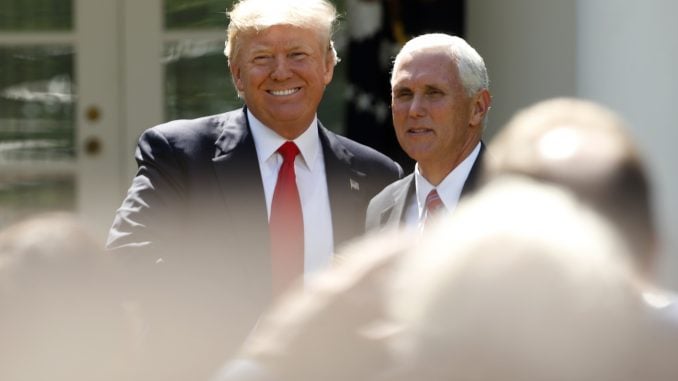
As I listened to President Donald Trump’s explanation of his decision to pull the United States out of the Paris Accord on climate change, I began to realize what a political masterstroke it was for him. Besieged by the (albeit evidence-free) Russia collusion claims and bewildered by his own party’s inability to deliver any major legislation for him to sign, Trump needed a domestic win.
The Paris Accord was the perfect field of play for Trump to score on, and he knew it. In the days leading up to the announcement, his team laid the groundwork: a June 1 Rose Garden ceremony was announced, and then “leaks” started about what Trump would, in fact, announce. “He’ll pull us out,” some assured. “He may change his mind at the last minute,” others warned. Although he had promised to exit the pact during the campaign, as late as May 27, CNN.com reported that “according to a top aide,” Trump was “evolving” on the issue.
After all this buildup, the stakes were high for an error-free performance, and for once, Trump complied. He set the sides of the debate perfectly: “The Paris Climate Accord is simply the latest example of Washington entering into an agreement that disadvantages the United States to the exclusive benefit of other countries, leaving American workers who I love and taxpayers to absorb the cost in terms of lost jobs, lower wages, shuttered factories, and vastly diminished economic production.”
Having done my research heading into the announcement, I thought to myself: That’s brilliant. He’s pitting American workers now against 0.17 degrees Celsius 100 years from now. But then Trump out-pitted my comparison with his now-famous line: “I was elected to represent the citizens of Pittsburgh, not Paris.”
Apparently not catching the figurative nature of the line is Donald Trump becoming too subtle? Pittsburgh mayor Bill Peduto shot back that “Pittsburgh stands with the world & will follow Paris Agreement,” tagging Hillary Clinton on the tweet. Clinton, you may recall, is a former senator from New York and a 2016 candidate for president. She ran on a platform of insulting anyone outside of blue-bubble cities, and was surprised to find out she lost the Electoral College especially since her advisers had assured her that all the college towns were easy wins for her.
Perhaps Trump should have chosen Pittsboro or Pitt County instead of Pittsburgh. Sure, it would have sent the D.C. press corps running for a North Carolina gazetteer, but the alliteration would have been maintained. (Plus they’re all named for William Pitt, the 1st Earl of Chatham, a chief advocate for America’s right to self-governance.)
Joking aside, the left’s reaction to Trump’s decision to disentangle from Paris may well end up being quite beneficial for medium-sized cities such as Pitt County’s Greenville. Peduto wasn’t the only big-city mayor tweeting about Paris. By one count, 10 governors and more than 60 mayors have stated that they would implement the accord, with or without Washington’s help (see note below).
What will they do? It’s hard to say, and it may end up being just symbolic gestures. But if the mayors follow through, and especially if whole states get in on the game, then jacking up the cost of doing business there will make cities that keep energy costs low look that much better by comparison. There are already plenty of capital and jobs flowing from blue states to red, so these moves would just accelerate an existing pattern.
So did Trump just announce the Rural Reinvigoration Act of 2017? Maybe that’s going a little far, but the left’s predictable reaction to the news (sample headline: “TRUMP TO WORLD: DROP DEAD”) only serves to further the divide between the elites who can worry about 0.17 degrees, a lifetime away; and those who worry about dinner, tomorrow.
The fact that the decision was a great move politically should not mask the fact that it was the right policy move, too. Paris was a horrible deal. Even if perhaps especially if you believe that climate change is made substantially worse by emitting carbon dioxide and that the effects will be catastrophic, you should oppose it.
Paris would have imposed massive, immediate costs on the United States but not on the world’s largest CO2 emitter, China. And that 0.17 degree Celsius by 2100? That’s if all countries lived up to their self-developed targets, an assumption that is laughable.
Trump was right to pull the U.S. out. It was good politics, good policy, and another campaign pledge realized.NOTE: After this editorial was published, North Carolina Gov. Roy Cooper announced he would sign on to an open letter pledging to “pursue ambitious climate goals, working together to take forceful action…”. It is unclear at this time how Cooper will fulfill the pledge. Drew Elliot is a member of the North State Journal’s editorial board, separate from the news staff. Unlike other newspapers, the North State Journal does not publish unsigned editorials; the author or authors of every editorial, letter, op-ed, and column is prominently displayed. To submit a letter or op-ed, see our submission guidelines.



